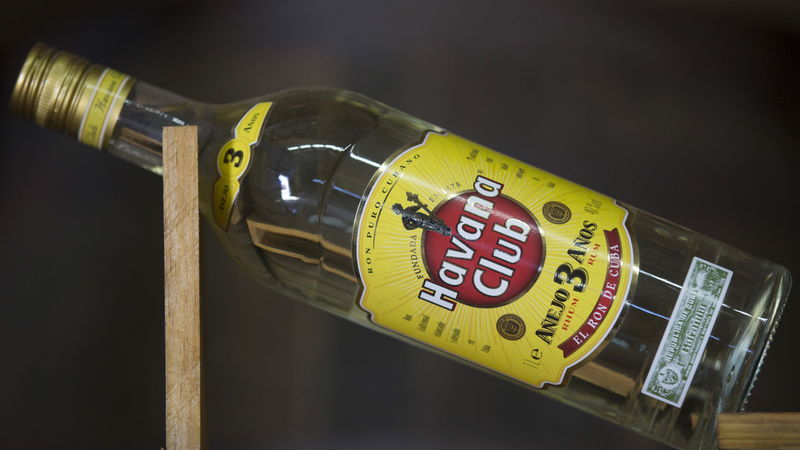By Elizabeth Pineau and Dominique Vidalon
HAVANA/PARIS (Reuters) - French drinks giant Pernod Ricard (PA:PERP) is poised to sell its Cuban-made rum in the United States once a 53-year-old trade embargo is lifted, going head-to-head with Cuban-founded Bacardi which dominates the world's biggest market.
Pernod's Havana Club will have to change its name to "Havanista" for U.S. customers, because Bacardi International, now Bermuda-based after its founders fled the communist island in the 1960s, has the U.S. rights to the "Havana Club" name.
But it is aiming more widely than the niche market made up mainly of Cuban communities based in Florida, 90 miles (145 km) from their homeland, who drink the Havana Club made by Bacardi in the U.S. Caribbean territory Puerto Rico.
"If the embargo is lifted, we could gain access to an enormous market and a substantial growth booster for the coming years," Jerome Cottin-Bizonne, CEO of Pernod Ricard's Havana Club, told Reuters at the San Jose de las Lajas distillery, where Havana Club is made in ageing cellars under a joint venture between Pernod and state-owned company Cuba Ron.
It is unclear when that might happen, but the company is beginning to benefit in a small way as relations between U.S. President Barack Obama and Cuban President Raul Castro warm.
American visitors to Cuba can now take home up to $100 worth of cigars and alcohol and Pernod-Ricard's CEO joined the delegation for the first official visit by a French president to Cuba last week.
The company invested $100 million last year in the distillery, which employs 550 people and now sells 50 million bottles, or 4 million cases, per year, ten times more than in 1993. Most go for export, thanks to the growing popularity of cocktails like Mojitos and Daiquiris.
Cottin-Bizonne said the U.S market could potentially bring Havana Club extra sales of 20 million bottles per year.
At roughly 1.7 million cases, it would still be dwarfed by the more than 9 million cases of U.S. sales of Bacardi's eponymous white rum and not quite match its own coconut rum brand Malibu that sold 1.9 million cases in the U.S. in 2013, according to last year's Liquor Handbook published by the Beverage Information Group.
BACARDI
The founders of Bacardi, the largest privately held spirits maker in the world, were among the most successful companies in Cuba before they were exiled in the 1960s.
The company declined to say whether it was considering any moves in view of a possible lifting of the U.S. embargo.
"Bacardi is proud of its Cuban roots," Bacardi spokeswoman Amy Federman said. "Regarding the diplomatic actions, we will need to wait and see what the impacts are."
Bacardi adopted the Havana Club name in the United States in 1994, having bought the recipe from the Arechabalas, another Cuban spirit-making family whose assets were confiscated by the Fidel Castro government in 1960.
The state continued to produce Havana Club and signed a deal with Pernod Ricard in the 1990s. The French firm tried to get the rights for the name in the United States, but fell foul of a law barring the trademark registration of Cuban brands confiscated under Fidel Castro's rule.
It registered the name "Havanista" for future use instead.
Havana Club is still a relatively small business for Pernod Ricard, the world's second-largest spirits maker after Diageo (L:DGE); the 4 million cases it sells each year in 120 countries make up less than 10 percent of sales of its 14 "strategic" spirit and champagne brands.
But the U.S. is the world's biggest market for rum, accounting for 36 percent of the 50 million 9 liter cases sold worldwide. Pernod ranks third in rum sales worldwide after Bacardi and Diageo, according to IWSR data.
Diageo's Captain Morgan is second in the United States with 5.7 million cases, while Bacardi's Havana Club is not in the top 68 brands listed by U.S. sales in the 2014 Liquor Handbook.
Bernstein analyst Trevor Stirling said the initial impact of "Havanista" was likely to be limited, partly because Puerto Rico and fellow Caribbean territory British Virgin Islands, where Captain Morgan is made, have tax advantages over Cuba.
"There is probably a small percentage of consumers who will be interested in the Cuban story," he said. "But there will also be a lot of Cuban-Americans who will highlight the fact that the Castro regime is a part owner of Havana Club/Havanista and agitate against it."
